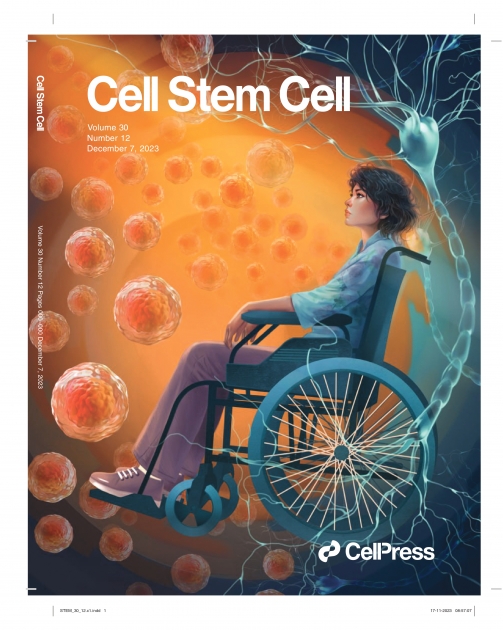
Abu Dhabi Stem Cells Center participates in international clinical trial for Multiple Sclerosis
Abu Dhabi Stem Cells Center (ADSCC), a subsidiary of PureHealth – the largest healthcare platform in the Middle East, has announced its participation in an international clinical trial for treating secondary Multiple Sclerosis (MS).
The study, conducted by a team of scientists led by the University of Milano-Bicocca and the University of Cambridge UK, has shown that an injection of a type of stem cell into the brains of patients living with MS is safe, well tolerated and has a long-lasting effect that appears to protect the brain from further damage.
Published in a leading medical journal Cell Stem Cell, the study is a critical step towards developing a cell therapy treatment for secondary progressive MS, for which no treatments currently exist.
Over two million people live with MS, and while treatments exist that can reduce the severity and frequency of relapses, two-thirds of MS patients still transition into a debilitating secondary progressive phase within 25-30 years of diagnosis, where disability grows steadily worse. Studies show that MS prevalence in UAE is 65 cases per 100,000.
While running clinical trials for the use of Extracorporeal Photopheresis (ECP) for MS, ADSCC scientists took part in this promising clinical trial to further enhance its research capabilities in MS. Research Scientist and CEO of ADSCC, Dr. Yendry Ventura, is amongst a group of scientists taking part in this international study from universities and research centres in Italy, UK, US, and Switzerland, cementing UAE’s position in the clinical research landscape globally.
In his comment, Dr. Yendry Ventura said: “Taking part in this clinical trial with key leaders in the field aligns with our mission at ADSCC. As we continue making strides in the world of research, further positioning the UAE as a clinical research and innovation hub, in line with the vision of PureHealth, ADSCC is committed to the overall well-being of our population locally and regionally. Research in MS is one of the key focus areas at ADSCC while further investing in our home-grown clinical trials and research projects like those we currently run for cellular therapies, cancer, diabetes, and kidney diseases.”
In MS, the body’s immune system attacks and damages myelin, the protective sheath around nerve fibres, disrupting messages sent around the brain and spinal cord. Key immune cells involved in this process are macrophages (literally ‘big eaters’), which ordinarily attack and rid the body of unwanted intruders. A particular type of macrophage known as a microglial cell is found throughout the brain and spinal cord.
In progressive forms of MS, they attack the central nervous system (CNS), causing chronic inflammation and damage to nerve cells. Recent advances have raised expectations that stem cell therapies might help ameliorate this damage. These involve the transplantation of stem cells (the body’s ‘master cells’), which can be programmed to develop into almost any type of cell within the body.
Previous work from the Italian and Cambridge team has shown in mice that skin cells re-programmed into brain stem cells, and transplanted into the central nervous system, can help reduce inflammation and may be able to help repair damage caused by MS.
Now, in research published in Cell Stem Cell, the team at the University of Milano-Bicocca, together with colleagues of the University of Cambridge and the Hospital Casa Sollievo della Sofferenza - a long-standing collaborator of ADSCC - have carried out a first-in-man, early-stage clinical trial that involved injecting neural stem cells directly into the brain of 15 patients with secondary MS recruited from two hospitals in Italy.
The team followed the patients for over 12 months, during which they observed no treatment-related deaths or serious adverse events. While some side effects were observed, all were either temporary or reversible.
All of the patients showed high levels of disability at the start of the trial – all required a wheelchair, for example – but during the 12-month follow-up period, none showed any increase in disability or a worsening of symptoms. None of the patients reported symptoms that suggested a relapse and nor did their cognitive function worsen significantly during the study. Overall, the researchers say this points to a substantial stability of the disease, without signs of progression.
Professor Stefano Pluchino from the University of Cambridge, who co-led the study, said: “We desperately need to develop new treatments for secondary progressive MS, and I am cautiously very excited about our findings, which are a step towards developing a cell therapy for treating MS. We recognise that our study has limitations – it was only a small study and there may have been confounding effects from the immunosuppressant drugs, for example – but the fact that our treatment was safe and that its effects lasted over the 12 months of the trial means that we can proceed to the next stage of clinical trials.”
Head co-leader Professor Angelo Vescovi from the University of Milano-Bicocca and a collaborator of the Abu Dhabi Stem Cells Center said: “While pharma and biotech companies have in the past been reluctant to invest in cell therapies, our study will add to the increasing excitement in this field. We are indeed so proud to have worked with key leaders in the field for this ongoing study and are thrilled to have participation from the Middle East, specifically from UAE-based Abu Dhabi Stem Cells Center.”
ENDS



























